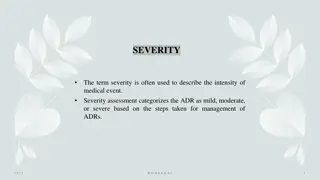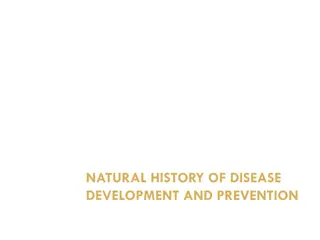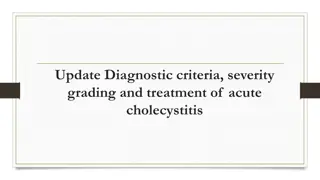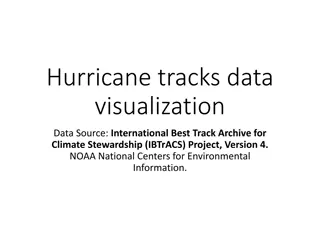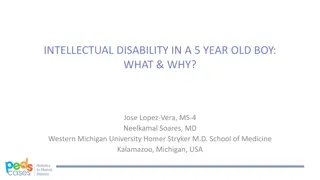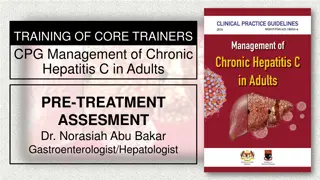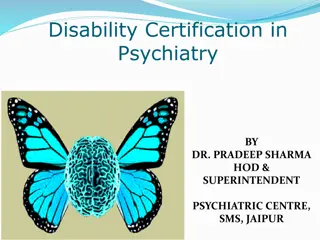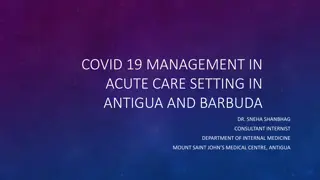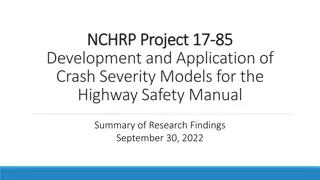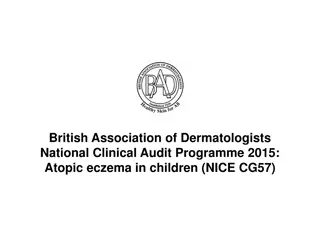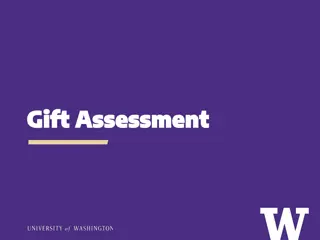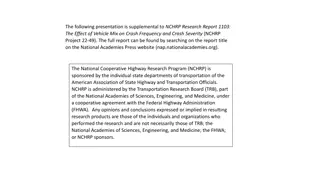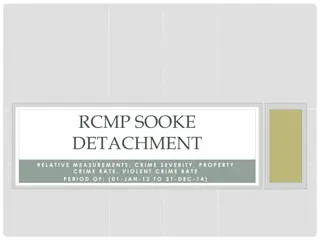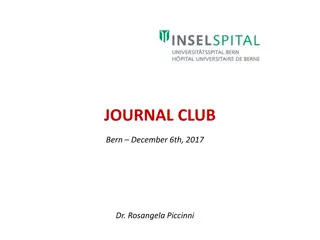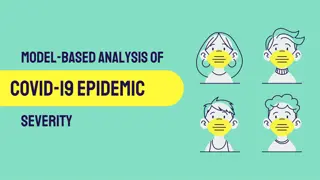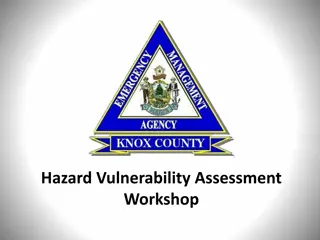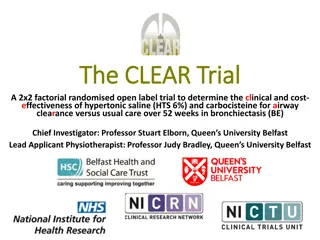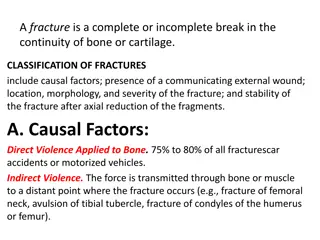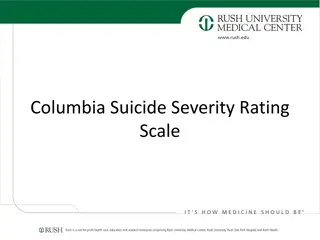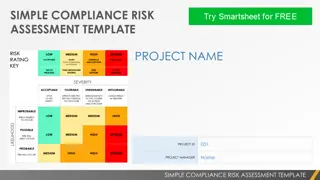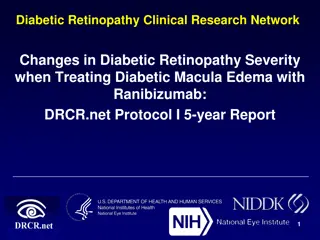Severity Assessment in Adverse Drug Reactions
The concept of severity assessment in adverse drug reactions (ADRs) categorizes the intensity of medical events into mild, moderate, severe, or lethal categories based on the required management steps. Various classification systems such as Karch and Lasagna, as well as modified Hartwig's and Siegel
4 views • 10 slides
Understanding the Natural History of Disease Development and Prevention
The natural history of disease development outlines the progression of a disease in an individual without intervention, from exposure to outcome. Learning objectives include defining prevention terms, understanding disease severity, prevention levels, and intervention measures. Studying disease prog
4 views • 16 slides
Sheffield Early Help Assessment Form Update and Integration with Extended Support Plan
Sheffield has introduced an updated Early Help Assessment form to streamline the assessment process within the Early Help System. This new form combines the Early Help Assessment with the Extended Support Plan, aligning various assessment tools and referral forms into one comprehensive document. The
5 views • 22 slides
Enhancing Language Learning Through Peer Assessment
Explore the benefits of peer assessment as a valuable tool for language learning, comparing it with self-assessment. Discover the components and challenges of self-assessment, along with the potential of peer assessment to improve accuracy and promote self-regulation. Gain insights into what peer as
3 views • 29 slides
Overview of DSW End Point Assessment Team Leader Level 3
DSW End Point Assessment Team Leader Level 3 provides a clear understanding of the assessment process, ensuring individuals comprehend why and when it occurs, responsibilities involved, and how DSW supports them. It covers topics such as what End Point Assessment entails, assessment design and deliv
1 views • 18 slides
Overview of Acute Cholecystitis: Diagnosis, Severity Grading, and Treatment
Acute calculous cholecystitis is a common digestive disease with varying treatment perspectives. The Tokyo Guidelines 2018 provide criteria and severity grading for the diagnosis of acute cholecystitis. Diagnosis involves local and systemic signs of inflammation along with specific imaging findings.
0 views • 18 slides
Visualizing Hurricane Tracks and Severity Over 40 Years
Explore hurricane track data from 1981 to 2021 sourced from the International Best Track Archive for Climate Stewardship. The visualization includes maps showcasing hurricane frequency, maximum severity by Saffir-Simpson scale categories, and trend indices. Follow the evolution of hurricane patterns
0 views • 18 slides
Understanding Intellectual Disability in a 5-Year-Old Boy
This case study discusses the diagnosis and severity of intellectual disability (ID) in a 5-year-old boy, distinguishing between developmental delay and ID. It covers the importance of genetic testing, particularly in cases like Fragile X syndrome, as well as the evolution of assessing ID severity b
0 views • 21 slides
Understanding Atopic Eczema in Children and Its Management
Atopic eczema is a chronic inflammatory skin condition in children with varying severity. Proper management is crucial to reduce its impact on a child's life. Identifying triggers, assessing severity, and implementing a stepped treatment approach are key in managing this condition effectively.
0 views • 15 slides
Donor Mapping for GBV Activities in the DRC
This report delves into the magnitude and severity of gender-based violence (GBV) in the Democratic Republic of the Congo (DRC) in recent years. It highlights the methodology used in data collection, key results, and leveraging findings for advocacy. The report also outlines the objectives of the ma
1 views • 19 slides
Understanding Assessment in Medical Education
Exploring the concepts of assessment in medical education, including defining assessment, types of assessment, reliability, validity, and aligning assessment methods with intended learning outcomes. The importance of constructive alignment and the impact of assessment on learning outcomes are also d
1 views • 12 slides
Assessment Matters in Sociology: Enhancing Learning Through Evaluation
Explore the significance of assessment in sociology education, focusing on key questions to evaluate current assessment procedures, review individual course assessments, and develop strategies to enhance student learning outcomes. Delve into the centrality of assessment in the learning process, with
1 views • 15 slides
Comprehensive Pre-Treatment Assessment for Chronic Hepatitis C in Adults
Core trainers in CPG management of Chronic Hepatitis C in adults must focus on pre-treatment assessment to identify co-morbidities, assess liver status, determine fibrosis severity, and conduct necessary blood investigations. Utilizing non-invasive methods for liver fibrosis assessment is crucial fo
0 views • 13 slides
Understanding Autism Spectrum Disorder: Overview and Assessment
Autism Spectrum Disorder (ASD) is a lifelong neurodevelopmental condition that affects social interaction, communication, and behavior. The spectrum includes a range of characteristics, from highly verbal individuals to non-verbal ones. Various disorders fall under the ASD umbrella, with different l
0 views • 14 slides
Insights into Managing Assessment in the Classroom by Assessment Research Group
Explore the importance of standards and assessment in education through the lens of the Assessment Research Group. Gain valuable perspectives on curriculum delivery, understanding the assessment system, learner assumptions, task parameters, and more. Discover how language, structure, and agency play
2 views • 25 slides
Management of COVID-19 in Acute Care Setting in Antigua and Barbuda by Dr. Sneha Shanbhag
This presentation by Dr. Sneha Shanbhag, a consultant internist at Mount Saint John's Medical Centre in Antigua, outlines the COVID-19 management strategies in the acute care setting. The presentation covers case severity breakdown, hospital admission guidelines, therapeutic management for mild to s
0 views • 10 slides
Chronic Primary Mitral Regurgitation: Evaluation and Management Considerations
Chronic primary mitral regurgitation (MR) presents various considerations in evaluating severity, symptoms, left ventricular function, and candidacy for mitral valve repair. The management decision involves assessing imaging findings, LV function, and the impact on mortality and quality of life. Sur
0 views • 9 slides
Enhancing Understanding through Assessment in Educational Design Workshop
Learn and collaborate on assessment practices in education design at the "Understanding by Design Assessment Focus" workshop. The agenda includes sessions on summative and formative assessment, feedback, reporting, and more. Engage in activities like generating questions, finding destination partner
1 views • 76 slides
Institutional Assessment Planning Workshop Feedback and Insights
Feedback and insights from a recent institutional assessment planning workshop led by Dr. Mark Nicholas at FSU S. Warren Conference Center & Inn. Participants provided feedback on the usefulness of the content, presenter knowledge, ability to develop assessment plans, post-training assessment knowle
1 views • 9 slides
Development of Crash Severity Models for Highway Safety Manual
Research findings from NCHRP Project 17-85 focused on assessing current HSM approaches for crash severity prediction, identifying gaps, developing new severity models, and creating guidance for model application. The study introduced distinctive methodologies like Quasi-induced Exposure and Ordered
0 views • 19 slides
Understanding Higher Education Assessment: The Complete Guide
Higher education assessment involves a systematic process of collecting, reviewing, and utilizing information to improve student learning and development. This guide covers the assessment cycle, learning outcomes, the mission behind assessment in higher education, what assessment is and is not, reas
1 views • 36 slides
Analysis of Atopic Eczema in Children: A National Clinical Audit Program
The British Association of Dermatologists conducted a national clinical audit program in 2015 to evaluate atopic eczema in children based on NICE guidelines. The audit included contributions from BAD and BSPD members, as well as private providers. It involved 128 submissions from 98 centers, with 12
2 views • 18 slides
Understanding Gift Assessment Process at University of Washington
The Gift Assessment Process at University of Washington involves applying a 5% assessment to select current-use gifts over $1,000 and under $5 million. This assessment supports the university's advancement efforts and institutional priorities by transferring 5% of eligible contributions to the Provo
1 views • 5 slides
Impact of Vehicle Mix on Crash Frequency and Severity
The supplemental presentation to NCHRP Research Report 1103 explores the influence of vehicle mix on crash frequency and severity. It highlights the project background, objectives, completed tasks, key deliverables, implementation strategies, and considerations for the Highway Safety Manual. The pro
0 views • 43 slides
Overview of Environmental Impact Assessment and Strategic Environmental Assessment Directives
Environmental Impact Assessment (EIA) and Strategic Environmental Assessment (SEA) play crucial roles in evaluating the impact of planned activities on the environment. This content delves into the concept, origins, development, and key elements of environmental assessment, discussing the legal fram
2 views • 35 slides
Institutional Assessment and Effectiveness Workshop Achievements at SUNY Oneonta
The Office of Institutional Assessment and Effectiveness at SUNY Oneonta has made significant progress in developing assessment protocols and processes, leading to a culture of assessment. This includes completing planning and assessment cycles, establishing objectives and procedures, and aligning u
1 views • 16 slides
Crime Statistics and Severity Analysis: RCMP Sooke Detachment
An overview of crime severity measurements, property crime rates, and violent crime rates in Sooke and comparable detachments. The data includes crime severity index scores, crime type contributions by year, and property/violent crime rates per 1000 population. The analysis shows changes over time,
0 views • 8 slides
Oregon Department of Education Assessment and Accountability Resources
Access important information on assessments, accountability, and reporting from the Oregon Department of Education. Find resources on updating assessment records, accessing student scores, and staying informed about assessment requirements for the 2023-24 academic year. Explore links for assessment
0 views • 55 slides
Oregon Department of Education - Assessment Resources and Updates
Explore the Assessment Record Updating Application (ARUA), Accountability Warehouse Extract (AWE), Secure Assessment Reports, and other important tools and information provided by the Oregon Department of Education for assessment data owners, analysts, and partners. Access links for assessment admin
0 views • 54 slides
Understanding Software Defect Management
Defects in software arise from various causes such as miscommunication, lack of experience, human factors, and poor testing skills. Different types of defects can be classified based on severity, work product, type of error, and status. Severity-wise classification includes major, minor, and fatal d
0 views • 30 slides
Prediction of Liver Fibrosis in NAFLD Patients: Impact of CAP Values
Steatosis has emerged as a significant diagnosis with NAFLD becoming a common cause for hepatologic evaluation. Liver stiffness measurement (LSM) using transient elastography is vital for assessing fibrosis severity in NAFLD patients. However, the accuracy of LSM can be influenced by obesity and sev
0 views • 35 slides
Insights into COVID-19 Epidemic Severity Analysis
Clinical studies and model-based analysis provide evidence and categorization of COVID-19 severity, symptoms, and risk factors. Severity stratification shows the distribution among tested patients, highlighting the attack rate and vulnerable populations. Studies aim to estimate severity accurately f
0 views • 33 slides
Comprehensive Hazard Vulnerability Assessment Workshop and Tools
In this collection of images and descriptions, various aspects of Hazard Vulnerability Assessment (HVA) workshops, tools, and scoring methods are covered. Topics include risk assessment, planning policies, human factors, probability considerations, environmental and non-environmental hazard scoring,
0 views • 21 slides
Gamifying Vulnerability Reporting for Coordinated Disclosure at Microsoft Security Response Center
Christa Anderson, a Senior Security Program Manager at Microsoft's Security Response Center, discusses the importance of gamifying vulnerability report data to encourage coordinated disclosure. The MSRC Top 100, announced at Black Hat USA, plays a crucial role in the public credit strategy by recogn
0 views • 13 slides
Pharmacovigilance Guidelines for Clinical Trials in Bronchiectasis Research
The CLEAR Trial is a 2x2 factorial randomized trial evaluating the effectiveness of hypertonic saline and carbocisteine for airway clearance in bronchiectasis patients. The trial, led by Professor Stuart Elborn and Professor Judy Bradley, focuses on pharmacovigilance activities, adverse event defini
0 views • 20 slides
Near Real-Time Flood Inundation Mapping Using Sentinel-1 Data During Hurricane Florence
A study by Shen, Xinyi and colleagues from the University of Connecticut has developed the RAdar Produced Inundation Diary (RAPID) algorithm for near real-time flood inundation mapping using Synthetic Aperture Radar (SAR) data from Sentinel-1 during Hurricane Florence. The analysis revealed large in
0 views • 8 slides
Understanding Fractures: Classification and Factors
A fracture is a break in bone continuity, classified by causal factors, presence of external wounds, location, morphology, severity, and stability post-reduction. Fracture causes include direct violence, indirect violence, bone diseases, and repeated stress. Fractures can be closed or open, with sev
0 views • 17 slides
Understanding the Columbia Suicide Severity Rating Scale (C-SSRS)
The Columbia Suicide Severity Rating Scale (C-SSRS) is an evidence-based suicide risk screening tool recommended by the Joint Commission. It is vital for identifying patients at risk of suicide, given the alarming rise in suicide rates. This tool helps healthcare professionals assess and address sui
0 views • 8 slides
Compliance Risk Assessment Template Project Report
This project report presents a simple compliance risk assessment template along with post-mitigation judgment, risk severity, risk level, mitigations, warnings, and remedies. It includes information on communication controls, risk severity levels, acceptability judgments, likelihood assessments, and
0 views • 5 slides
Long-Term Effects of Ranibizumab Treatment on Diabetic Retinopathy Severity: DRCR.net Protocol I 5-Year Report
Phase 3 trials have demonstrated favorable changes in diabetic retinopathy severity in eyes treated with ranibizumab for diabetic macular edema. This study focuses on the 5-year outcomes of ranibizumab therapy in managing diabetic retinopathy progression, especially with decreasing exposure to anti-
0 views • 24 slides
